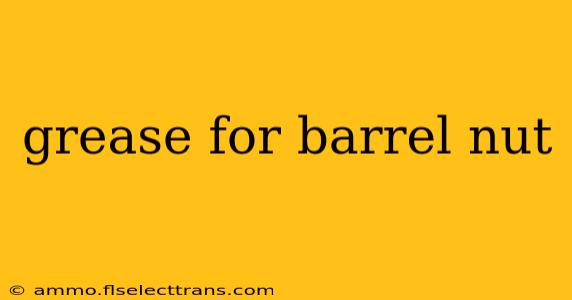Choosing the right grease for your barrel nut might seem like a minor detail, but it's crucial for maintaining the accuracy and longevity of your firearm. The wrong grease can lead to malfunctions, increased wear, and even damage to your weapon. This comprehensive guide will help you understand the importance of proper lubrication and select the ideal grease for your specific needs.
Understanding the Barrel Nut's Role
Before diving into grease types, let's clarify the barrel nut's function. This critical component secures the barrel to the upper receiver of your firearm, ensuring proper alignment and preventing movement during firing. The barrel nut threads experience significant stress and friction, making lubrication essential to prevent seizing, galling, and premature wear.
Why Proper Lubrication is Crucial
Using the right grease offers several key advantages:
- Reduced Friction: Minimizes friction between the barrel nut threads, facilitating smoother installation and removal. This is especially important for frequent barrel changes.
- Corrosion Protection: A high-quality grease creates a barrier against moisture and other corrosive elements, extending the lifespan of your barrel nut and the surrounding components.
- Improved Accuracy: By ensuring smooth operation, proper lubrication contributes to consistent accuracy by preventing barrel shift or movement.
- Easier Maintenance: Well-lubricated threads make future maintenance and cleaning easier, saving time and effort.
Types of Grease and Their Suitability
Not all greases are created equal. Several factors determine the best choice for your barrel nut:
1. High-Temperature Grease
High-temperature greases are formulated to withstand the heat generated during sustained firing. This is particularly important for competitive shooters or those who engage in extended shooting sessions. Look for greases with a high dropping point, indicating their resistance to heat breakdown. Examples include specialized gun greases designed for high-temperature applications.
2. Low-Temperature Grease
Low-temperature greases maintain their consistency and lubricity even in cold conditions. If you live in a colder climate or store your firearm in a less-than-ideal environment, a low-temperature grease will prevent the grease from becoming too stiff, hindering installation or removal.
3. Synthetic vs. Petroleum-Based Greases
Synthetic greases generally offer superior performance in extreme temperatures and provide better protection against corrosion. Petroleum-based greases are typically less expensive but may not perform as well in harsh conditions. The best option depends on your climate and usage.
4. Specialty Gun Greases
Many manufacturers produce specialty gun greases specifically formulated for firearms. These greases often contain additives that enhance their lubricating properties, corrosion resistance, and cleaning ease. They're usually a good investment, offering superior performance to general-purpose greases.
Applying the Grease Properly
The application method is as important as the grease itself. Apply a small amount of grease to the barrel nut threads, ensuring even coverage. Avoid excessive grease, as this can attract dirt and debris. A thin, even layer is all that's needed.
Conclusion: Choosing the Right Grease
Selecting the appropriate grease for your barrel nut is crucial for maintaining your firearm's performance and extending its lifespan. Consider factors such as climate, shooting frequency, and environmental conditions when making your decision. Investing in a high-quality grease specifically designed for firearms will ensure optimal performance and help maintain the accuracy and reliability of your weapon. Remember to always consult your firearm's manual for specific recommendations.

